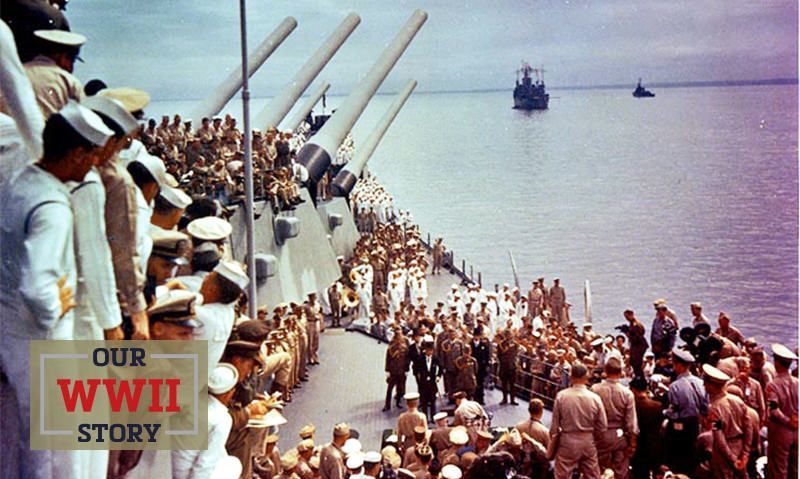
OUR WWII STORY: Life on the homefront
Donald Ray Knapp of Lakeland, Fla., submitted the following to Legiontown:
“I was only 10 years old when Pearl Harbor was attacked, and I still regard myself as a veteran of that war. I will explain! From Dec. 7, 1941, and the next five years I heard news on the radio, Paramount Pictures on the movie screen and the conversation from relatives, neighbors and schoolteachers. Even school friends wore Navy hats, GI shoes and other treasure older brothers gave them. All men 18 and older had to register at the post office and take physical exams to obtain classification for the draft. This included nearly every family that had at least one son or father.
TV did not become a part of our lives until after the war. I can recall family meetings and the topic of conversation would always begin with ‘Have you heard from your son lately?’ The answer often was with tears.
We were introduced to life with air raid wardens and blackouts; pictures of air raids in England that included buzz bombs without pilots. We also saw pictures of inhuman treatment of prisoners. At the movie theaters, when German or Japanese pictures were shown the audience would react with boos and jeers. In school we were encouraged to buy defense stamps and bonds. At the dime stores, sometimes shoppers would pick up an item made in Japan and throw it on the floor.
Before Pearl Harbor many workers were without jobs. Then all of a sudden there was a shortage of labor. Now it was time for the women and children to do the jobs the young men did before! We did it with pride and the feeling of contributing to the war effort. That was a great feeling that I will never forget.
I worked on the farm and did jobs able-bodied men had done before. I drove a tractor and took care of livestock way before my time. My first job before the war was to take fresh water to the hay hands. Now I was the hay hand. Boy Scouts collected newspapers and Girl Scouts knitted blankets and other jobs that had to be done by someone. And they did it. Like taking care of babies and older citizens. This allowed women to work in the defense plants and so on. This changed the world, about the income of two people in the American family. Each family was given ration books. This gave the seller the right to sell you a product. Gas stamps, shoe stamps, meat, milk, butter and sugar were all rationed.
In a small way I felt like I was deprived of my childhood growing-up days. The toys and things we would normally get at Christmas did not exist. You could not buy a bike or a sled at any price. All we got were hand-me-downs from older brothers. I can look back now and think that it was a small item and I was lucky to have our family without injury. I can look at the gifts my children, grandchildren and great-grandchildren have today and be happy for them. I can remember the one thing I always had to tell my troubles to was my dog. It's probably why, even during my adult and married life, we always had a family dog.
The end of the German war was a feeling of "Now we can concentrate on the South Pacific half of the war." The end of the war with Japan was a memorable event. Our church MYF group was attending a rally at the college in Lebanon, Ill. There were about five hundred of us. We thought the end was in sight because of the atomic bombs. Then we heard the church bells ringing, horns honking, people acting like something really big happened. We marched about eight blocks and joined the citizens of that college town where country folk came pouring in from all directions for celebration. This was a scene that no one could ever forget. The Great War won by the Greatest Generation was now history!
Later in my life I was an officer in the Marine Corps, assigned to the 3rd Marine Division in Korea. The conflict had agreed to a cease-fire and I was assigned to an amphibious battalion in Japan. I didn't know it at the time but this turned out to be another thrill because we made practice landing at several of the islands I had learned about when I was a kid. My biggest thrill was the 10-year anniversary since the first landing on Iwo Jima. The Marine Corps Band was beneath our flag on top of Suribachi. There was a flyover with both amphibious battalions from Japan and Okinawa at attention. Not a dry eye on that volcano. No one said a word for a long time. Just thinking about what it took to raise that flag.
I had one more thrill. That was a trip to Hawaii, and I stood where the surrender ceremonies were held on the battleship Missouri, from where you could see the site of oil bubbles leaking to the surface from the submerged Arizona.
Not all veterans wore a uniform.”
